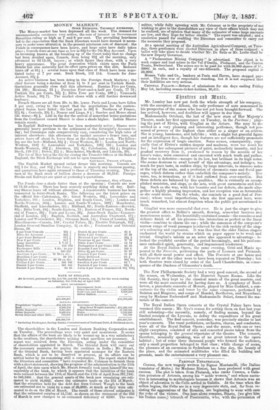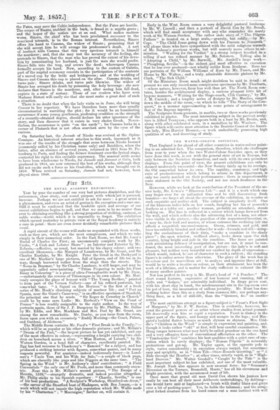PARISIAN THEA.TRICALS„
Cannna, the new tragedy written by Signor Montanelli, (the Itelian translator of Medea,) for Madame Ristori, has been produced with great success. The plot is taken from Plutarch, who ranks Camma, a Galatian priestess of Artemis, among his "noble women," and whose narrative is interesting to mythologists because it shows that Artemis was an object of adoration to the Celts settled in Galatia. At the time when the action begins, the Celts are in a very degenerate state, and, far from resisting the aggressions of the Romans, are beginning to wear with ease the yoke of the victors. One hero alone remains, Sinato, (we give him his Italian name,) tetrarch of Pessinuntia, who, with the permission of the Fates, may save the Celtic independence. But the Fates are hostile. The corpse of-Sinato, stabbed in the back, is found in a my,rtle grove ; and the hopes of the nation are at an end. What mas matters worse, Sinoro the chief who has been proclaimed successor to the murdered tetrarch, is in the Roman interest. Nevertheless, Sinoro offers his hand to Gamma, the widow of Sinato ; promising that if she will accept him he will avenge his predecessor's death. A sort of instinct tells Camma that this very specious tetrarch is himself the murderer; and, that she may test the accuracy of the feeling, she pretends to Sinoro, that the man who has proved the extent of his devotion by assassinating her husband, is just the man she would prefer. Sinoro falls into the trap, and avows the deed ; whereupon Gamma formally accepts his hand. Now according to the custom of Galatia, part of the nuptial ceremony consists in the participation of the contents of a sacred cup by the bride and bridegroom • and at the wedding of Sinoro and Gamma this cup is placed on the after. Gamma drinks, and turns pale ; Sinoro drinks, and turns pale likewise. The widow of Sinato has avenged his death by poisoning the holy beverage : she now declares that Sinoro is the murderer, and, after seeing him fall dead, expires in a state of ecstasy. Those of our readers who have seen Madame Ristori will easily see that she must make a great deal of such a situation.
There is no doubt that when the lady visits us in June, she will bring Comma in her repertory. We have therefore been more than usually circumstantial in narrating the plot ; for it would be an humiliating occurrence if some young gentleman, professing erudition on the strength of a recently-obtained degree, should declare his utter ignorance of the story, and then discover that it exists in very choice Greek. Nevertheless, the occurrence is quite "on the cards"; for Comma lurks in a corner of Plutarch that is not often searched save by the eyes of the curious.
On Saturday last, the ,Tommie of Nicole was revived at the OperaComique. An historical interest attaches to this work, inasmuch as it was one of the results of the struggle that arose between Nicole Isouard (commonly called by his Christian name only) and Boieldieu, when the latter, after an absence of several years, returned in 1811 from St. Petersburg to Paris, and finding the former dominant over the lyrical stage, contested his right to this enviable supremacy. The musical strife seems to have been wholesome to Nicole, for ,Toconde and Jeannot et Colin, both produced in 1814, arc now esteemed the best of his works, although they did not excite such a furor as his Cendrillon, which was brought out in 1810. When revived on Saturday, Joeonde had not, however, been played since 1846.



































 Previous page
Previous page